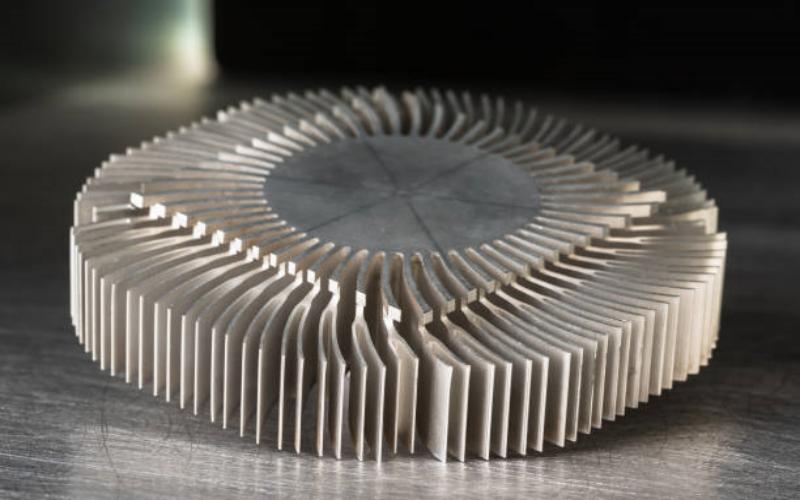The Importance of Heat Sinks in Electronic Devices
Introduction: In the world of electronic devices, heat management is a critical aspect that often goes unnoticed by users. However, it plays a crucial role in ensuring optimal performance and longevity of these devices. One of the key components responsible for heat dissipation is the heat sink. This article explores why heat sinks are important in electronic devices and how they contribute to their overall functionality.
1. Understanding Heat Generation in Electronic Devices
Electronic devices generate heat as a byproduct of their operation. This heat is primarily produced by the various active components such as processors, graphics cards, and power amplifiers. The continuous operation of these components can lead to a significant increase in temperature, which, if not managed properly, can have detrimental effects on the device's performance and reliability.
2. The Role of Heat Sinks in Heat Dissipation
A heat sink is a passive cooling device that helps dissipate heat generated by electronic components. It is typically made of a thermally conductive material, such as aluminum or copper, which efficiently transfers heat away from the source. The heat sink works by providing a larger surface area for heat to dissipate into the surrounding environment, thus preventing the device from overheating.
3. Enhancing Thermal Conductivity
One of the primary functions of a heat sink is to enhance the thermal conductivity between the heat-generating component and the surrounding environment. The thermally conductive material used in heat sinks helps bridge the gap between the component and the heat sink itself, ensuring efficient transfer of heat. This allows the heat to spread across a larger area, reducing the temperature of the component and preventing thermal damage.
4. Preventing Thermal Runaway of Heat Sinks
Thermal runaway is a phenomenon where the temperature of a component increases rapidly due to insufficient heat dissipation. This can lead to a chain reaction, causing other components to heat up as well. Heat sinks play a vital role in preventing thermal runaway by effectively dissipating heat and maintaining a stable operating temperature. By keeping the temperature within acceptable limits, heat sinks help ensure the overall reliability and performance of electronic devices.
5. Increasing Longevity of Electronic Components
Excessive heat can significantly reduce the lifespan of electronic components. Continuous exposure to high temperatures can lead to thermal stress, which can cause components to wear out more quickly and fail prematurely. Heat sinks help mitigate this issue by efficiently dissipating heat and keeping the temperature within safe limits. By reducing thermal stress, heat sinks contribute to the longevity of electronic components, ultimately extending the lifespan of the device itself.
6. Improving Performance and Efficiency
Heat can have a detrimental effect on the performance and efficiency of electronic devices. High temperatures can cause components to operate at suboptimal levels, leading to reduced performance and increased power consumption. Heat sinks help maintain the temperature within a desirable range, ensuring that components can operate at their full potential. By improving performance and efficiency, heat sinks contribute to an enhanced user experience and reduced energy consumption.
7. Enabling Compact and Slim Designs
In today's world, electronic devices are becoming increasingly compact and slim. However, this trend poses a challenge in terms of heat management. Heat sinks play a crucial role in enabling these compact and slim designs by effectively dissipating heat in limited spaces. With their ability to efficiently transfer heat, heat sinks allow manufacturers to design smaller devices without compromising on performance or risking overheating.
8. Noise Reduction of Heat Sinks
Heat sinks not only help in cooling electronic components but also contribute to reducing noise levels. When components operate at high temperatures, they often require fans or other cooling mechanisms, which can generate noise. By effectively dissipating heat, heat sinks help maintain lower operating temperatures, reducing the need for additional cooling mechanisms and thereby minimizing noise levels.
9. Importance in Overclocking and High-Performance Systems
Overclocking and high-performance systems push electronic components to their limits, resulting in increased heat generation. Heat sinks play a crucial role in these scenarios by providing efficient heat dissipation, allowing users to maximize the performance of their devices without risking overheating or component failure. Overclocking enthusiasts often invest in high-quality heat sinks to ensure stable and reliable operation under demanding conditions.
10. Conclusion
In conclusion, heat sinks play a vital role in electronic devices by efficiently dissipating heat and maintaining optimal operating temperatures. They enhance thermal conductivity, prevent thermal runaway, increase component longevity, improve performance and efficiency, enable compact designs, reduce noise levels, and are essential for overclocking and high-performance systems. Understanding the importance of heat sinks can help users appreciate the critical role they play in ensuring the reliability and longevity of their electronic devices.

